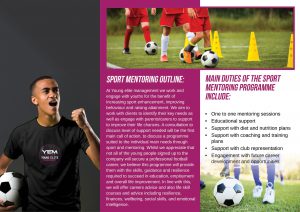

Category: Schools
Dear Colleagues
We are streamlining the email addresses you currently use to contact HR Teams into one single email account. It is hoped that by using one single email for all your school’s HR Operational requests, you will have the peace of mind that your instructions will be picked up by a member of the Schools HR Team.
Schools HR Operations – from 22 June 2022, please use: hrschools@haringey.gov.uk to send any instruction on new starters, leavers, recruitment, contract variations, etc to Schools HR Team. We will be monitoring the inbox daily and processing requests.
Schools HR Advisory – you should continue to contact your dedicated school’s Employee Relations Adviser directly using their individual email addresses.
Could you please help me cascade this information to all relevant officers in your schools.
Please do not hesitate to contact me if you have any query(s) regarding this email.
Best wishes
Chidi Okwesilieze (he/him, Mr)
Head of Schools HR
Human Resources & Organisational Development
L.B Haringey
Alexandra House, 10 Station Road, London N22 7TR
07989 413954
Dear Colleagues
We are streamlining the email addresses you currently use to contact HR Teams into one single email account. It is hoped that by using one single email for all your school’s HR Operational requests, you will have the peace of mind that your instructions will be picked up by a member of the Schools HR Team.
Schools HR Operations – from 22 June 2022, please use: hrschools@haringey.gov.uk to send any instruction on new starters, leavers, recruitment, contract variations, etc to Schools HR Team. We will be monitoring the inbox daily and processing requests.
Schools HR Advisory – you should continue to contact your dedicated school’s Employee Relations Adviser directly using their individual email addresses.
Could you please help me cascade this information to all relevant officers in your schools.
Please do not hesitate to contact me if you have any query(s) regarding this email.
Best wishes
Chidi Okwesilieze (he/him, Mr)
Head of Schools HR
Human Resources & Organisational Development
Alexandra House, 10 Station Road, London N22 7TR
07989 413954
The LTA Youth Schools programme is offering free online courses for primary and secondary schools to guide you through how to use our innovative resources which teachers have developed for teachers. As well as PE resources that have been mapped to the national curriculum, tennis is a great way of developing personal and character skills and we have cross-curricular materials to support schools in achieving wider school outcomes. Teachers who complete the course will receive a resource pack and a £250 voucher* to spend on ten hours of team teaching support from an LTA Accredited Coach, or equipment!
Sign up to the online course and access all the resources at: www.lta.org.uk/schools
- Limited to one per school.
- The Association for Physical Education’s Professional Development Board has granted The LTA Youth Schools programme ‘Approved Provider’ status’
- Supported by The Tennis Foundation.
As one of ten local authorities in England with high rates of serious youth violence (SYV), Haringey has been allocated £1.28m by the DfE over three years to deliver interventions for 10–14-year-olds. The Haringey SAFE Taskforce is leading this work. Most secondary school Heads are members of the Taskforce, which is chaired by the Direct of Children’s Services, and the project will be independently evaluated.
The Board will commission targeted interventions to work with young people – usually in school – to address behaviour, improve attendance, reduce exclusions, and reduce the risk of individuals failing to enter education, employment, or training.
We recently completed a strategic needs analysis and its thoroughness was commended by the Department for Education. A key theme was that serious violence is mostly committed by boys and they are most often the victims. The project will submit its proposals to the DfE on 24 June and the interventions proposed include:
Expanding the primary transition outreach pilot project from the Haringey Learning Partnership to target boys aged 10-11 at risk of exclusion and supporting them to have a successful transition to senior school.
Expanding the secondary outreach project from the Haringey Learning Partnership for young people at risk of exclusion aged 11-14 with a focus on cognitive behavioural approaches which are effective.
Expanding the successful social workers in schools (SWIS) model to schools that do not currently have social workers and have been identified in our strategic needs analysis as having significant number of young people at risk of serious youth violence. The taskforce will also be reviewing options for an additional intervention.
Once our plans have been signed-off we will provide further updates as we gear up towards implementation in September. For all enquires contact John Webster, Project Coordinator. john.webster@haringey.gov.uk
Department for Education – GOV.UK (www.gov.uk)
- Information for schools on preparing for the National Tutoring Programme data collection
- Post-16 educational and employment outcomes of children in need (publishing.service.gov.uk)
- An update for schools on recovery premium funding
- Information for schools on applying to join the teacher and headteacher reference groups
- information for all education settings on new teacher training and development opportunities
- Find, join or create a network for school business professionals
- How business professionals working in schools can find, join or create a network of local school business professionals.
- Find a school business professional network – GOV.UK (www.gov.uk)
- Join or create a network for school business professionals – GOV.UK (www.gov.uk)
-
Children’s social work workforce: attrition, caseload and agency workforce
-
HE Data Reduction Taskforce terms of reference and meeting minutes
- IDSR release June 6 2022 – Removal of Early Years Foundation Stage (EYFS) dataFollowing the reforms to the Early Years Foundation Stage (EYFS) and changes to the administration and moderation of EYFS profile data, Ofsted has taken the decision that the EYFS profile will no longer be included in the Inspection Data Summary Report (IDSR). This is in line with action taken by the Department of Education for their Analyse School Performance (ASP) products. As of Monday 6 June, the IDSR no longer contains EYFS profile data.
The DfE is seeking views on ASP, so they can better understand users’ needs. To this end, a survey is available on the ASP website.
Tell us your magazine feature ideas!
Think you have a great story idea for Haringey People magazine? We want to hear from you!
Haringey People is about the people for the people, and we need your creativity to help us fill its pages with the kind of stuff you want to read. Stories about:
- Amazing people in the borough doing amazing things
- Small businesses and charities helping to make a difference
- Fun activities and events that have brought the community together
- And so much more that we haven’t even thought about yet!
Let’s collaborate – send us your story idea by completing this short form and help us shape your magazine.
To read past issues of Haringey People visit our website.
The Department for Education is encouraging more schools and colleges to identify and train a senior mental health lead. This is backed by a further £7 million in training grants from government, bringing the total amount of funding for 22/23 to £10 million.
Over 8,000 schools and colleges claimed a £1,200 grant to train a senior mental health lead between October 2021 and March 2022, including over half of all state-funded secondary schools in England and at least three in ten state-funded primary schools and colleges. The training provides knowledge and skills to develop a whole school or college approach to mental health and wellbeing in your setting.
Up to two thirds of all eligible schools and colleges in England will have the opportunity to benefit from quality assured senior mental health lead training by the end of this financial year.
For guidance on how to claim a grant and sign up for training, please go to Senior mental health lead training – GOV.UK (www.gov.uk).
Dear colleagues
I just wanted to share some key information on the monkeypox outbreak in the UK with you. At the moment the overall risk to the public is low, and the overall situation and comms is being managed by UK Health Security Agency.
Monkeypox is a viral infection usually associated with travel to West Africa, but we are seeing cases transmitted in the UK at the moment. The number of cases is low, but is rising and we expect to see more cases as public awareness of symptoms is increasing. In the medium term, due to the low transmissibility of the infection, public health experts believe the numbers ware likely to start to come under control. At present cases at a local authority level are not being disclosed due to small overall numbers and potential to identify individual patients.
The virus can spread if there is close contact between people with infectious lesions (pox). Recent cases are predominantly in gay, bisexual and other men who have sex with men, so UKHSA are advising these groups to be alert to any unusual rashes or lesions on any part of their body, especially their genitalia, and to contact a sexual health service if they have concerns. Risks of transmission in schools, nurseries and other community settings is very low at present. As a local authority and commissioner of sexual health services, we are working with our sexual health services to ensure they have the latest information on how to identify and manage cases safely and reduce impacts on staff who may have to self isolate if they are in contact with a monkey pox case.
Background info on monkeypox
Mokeypox is usually a mild self-limiting illness, spread by very close contact with someone with monkeypox and most people recover within a few weeks.
Symptoms
- Unusual rashes or lesions on the body such as the face or genital area
- Fever
- Muscle aches
- Chills and exhaustion
- Headaches
- Swollen lymph nodes
The virus can enter the body through broken skin, the respiratory tract or through the eyes, nose or mouth.
If you get infected with monkeypox, it usually takes between five and 21 days for the first symptoms to appear. Symptoms include fever, headache, muscle aches, backache, swollen lymph nodes, chills and exhaustion.
A rash can develop, often beginning on the face, then spreading to other parts of the body. The rash changes and goes through different stages – a bit like chicken pox – before finally forming a scab, which later falls off.
The virus can spread if there is close contact between people through:
- touching clothing, bedding or towels used by someone with the monkeypox rash
- touching monkeypox skin blisters or scabs
- the coughs or sneezes of a person with the monkeypox rash
Anyone with concerns that they could be infected should see a health professional but make contact with the clinic or surgery ahead of a visit. NHS 111 can also give advice.
We will share further updates as needed as the situation develops.
Additional information is available on the government and NHS websites:
Monkeypox – GOV.UK (www.gov.uk)
Dr Will Maimaris
Director of Public Health
Haringey Council
Mobile: 07919 357421
Email: will.maimaris@haringey.gov.uk
